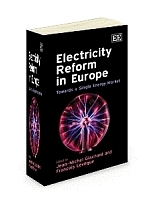The realisation of a European internal market for energy is still a work
in progress. Written by leading European scholars and discussed with major energy
stakeholders, this book presents a thorough analysis of the motives and methods needed to
achieve a single European energy market.
The authors discuss the critical issues surrounding an internal European energy market
including: market design, competition and market power, sustainable energy versus the
market, regulation and harmonisation, benchmarking and indicators, modelling of
competition, market prices and energy forecasts. They provide a multi-disciplinary
assessment of the ‘best way’ to build the market base of a future European energy
policy.
Electricity Reform in Europe will be of great interest to decision makers and managers in
the energy industry or business sector as they will be able to see the whole European
energy policy ‘picture’ beyond their own corporate interests. The book will also
appeal to national and European energy administrations, regulatory bodies and policy
makers providing a synthesis of all relevant policy issues.
‘The SESSA study on the Internal Energy Market was an important and influential
contribution towards the Commission’s proposal for a third package of proposals,
intending to bring more effective competition and better security of supply to Europe’s
energy markets. This volume, based on the results of the study is an important and welcome
contribution to the ongoing debate on these proposals.’
– Andris Piebalgs, Commissioner for Energy at the European Commission
‘The chapters in this book are written by the leading European scholars who have studied
the structure, behavior and performance of liberalised electricity markets in many
European countries as well as in other regions of the world. Both the analyses and the
policy recommendations contained in this volume are well worth careful consideration by
policymakers in Europe, as well as by policymakers in other countries that are seeking to
adopt successful electricity sector liberalisation programs.’
– From the foreword by Paul L. Joskow, Massachusetts Institute of Technology, US
‘Dynamism or dissipation? Competition or national champions? Will enlargement promote or
delay reform? Energy economists contemplate the challenges posed by the “restless and
discontent” European Commission.’
– Stephen Littlechild, University of Birmingham and Judge Institute for Management
Studies, University of Cambridge, UK
‘The challenge of European electricity reform is being met, although gradually, delays
notwithstanding. This book provides precious help in spotting where the necessary further
efforts should be directed. In the US mistakes and delays have occurred, no less than
in Europe, but an aggressive federal regulator (absent in Europe) is working to overcome
them. Electricity markets do not happen, they have to be built. Here are suggestions
for a workable European market design. No ideology, just competence and wisdom from
both theory and experience. Will Europe learn?’
– Pippo Ranci, Universita Cattolica del Sacro Cuore, Italy
Edited by Jean-Michel Glachant, Loyola de Palacio Professor for
European Energy Policy and Director, Florence School of Regulation, European University
Institute, Italy and Professor of Economics, Université Paris-Sud, France and
François Léveque, Professor of Law and Economics, École des mines de Paris,
France
Contents:
Foreword: US vs EU Electricity Reforms Achievement
Paul L. Joskow
PART I: PROPOSALS FOR ACHIEVING THE EUROPEAN UNION ELECTRICITY MARKET BY 2009
1. The Electricity Internal Market in the European Union: What to do Next?
Jean-Michel Glachant and François Léveque
PART II: ASSESSMENT OF CORE ISSUES IN THE MAKING OF THE EUROPEAN UNION
ELECTRICITY MARKET
2. Refining Market Design
David Newbery
3. Addressing Market Power and Industry Restructuring
Lars Bergman
4. Harmonizing an Effective Regulation in Europe
Einar Hope and Balbir Singh
5. Ensuring EU Enlargement to New Member States
Christian Von Hirchhausen and Georg Zachmann
6. Investing for Sustainability
Ignacio Pérez-Arriaga and Julián Barquín
7. Policy Assessment and Good Practices
Richard Green, Arturo Lorenzoni, Yannick Pérez and Michael Pollitt
PART III: IN-DEPTH STUDIES OF THREE CHALLENGES FOR THE EUROPEAN UNION
ELECTRICITY MARKET (MEASURING MARKET POWER, CONVERGENCE OF WHOLESALE PRICES AND ENERGY
POLICY)
8. How Well Can One Measure Market Power in Restructured Electricity Systems?
Yves Smeers
9. The EU Integration of the New Member States’ Electricity Markets – Testing
for Wholesale Price Convergence Using the Kalman Filter
Georg Zachmann
10. Long-Term Scenarios for the Strategic Energy Policy of the EU
Pantelis Capros and Leonidas Mantzos
Postface: Design and Regulation of EU Energy Markets – Between Competition
Policy and Common Energy Policy
Jorge Vasconcelos
Index
384 pages, Hardcover
Księgarnia nie działa. Nie odpowiadamy na pytania i nie realizujemy zamówien. Do odwolania !.


